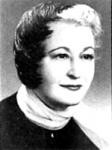
Lydia Hall or Lydia Eloise Hall (1906-1969) was an innovator in nursing practice. She established and directed the Loeb Center for Nursing and Rehabilitation at Montefiore Medical Center in Bronx, New York, from 1963 to 1969.
Through her research in nursing and long term care, Hall developed a theory that the direct professional nurse-to-patient relationship is itself therapeutic and that nursing care is the chief therapy for the chronically ill patient. Montefiore Hospital invited her to implement her theories by establishing and becoming director of the Loeb Center.
Lydia Hall published over 20 articles about the Loeb Center and her theories of long term care and chronic disease control. She held a bachelor of science degree in public health nursing and a master of arts degree from Teachers College. In 1967, she received the Teachers College Nursing Education Alumni Association Achievement in Nursing Practice Award.
The "Core, Care, and Cure" Theory was developed in the late 1960's. She postulated that individuals could be conceptualized in three separate domains: the body (care), the illness, (cure), and the person (core).
Lydia Hall believed patients should receive care ONLY from professional nurses. Nursing involves interacting with a patient in a complex process of teaching and learning. Hall was not pleased with the concept of team nursing — she said that any career that is defined around the work that has to be done, and how it is divided to get it done, is a trade (rather than a profession).
Nursing functions in all three of the circles (core, care, and cure) but shares them to different degrees with other disciplines. For example, the nurse’s function in the cure circle is limited to helping patients/families deal with the measures instituted by the physician. She felt that the care circle was exclusive to nursing. The core circle was shared with social workers, psychologists, clergy, etc.
